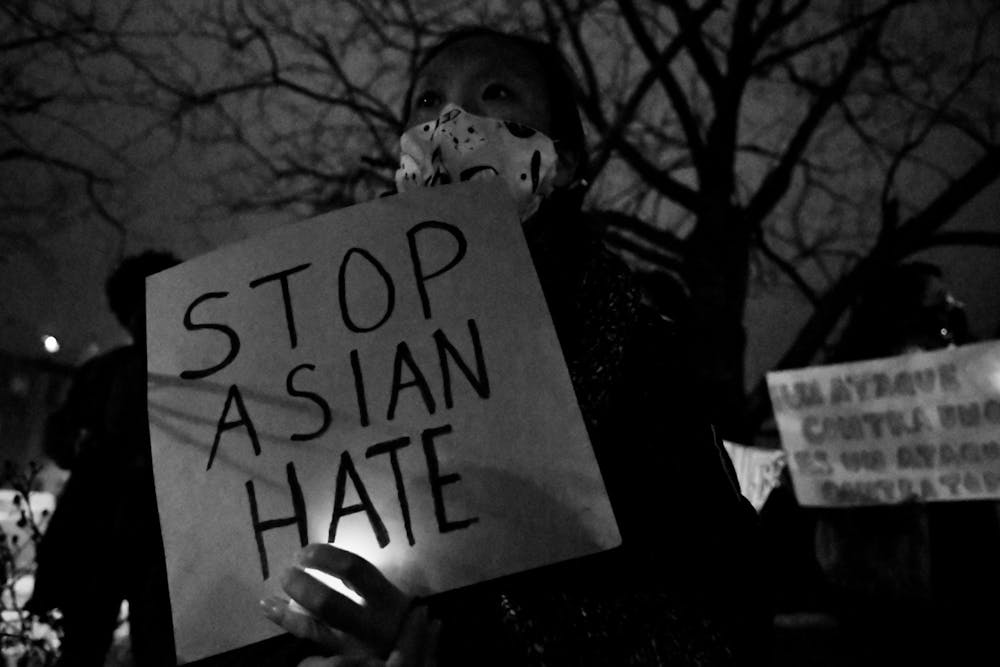Two recent Penn graduates' research, which found that the majority of surveyed Penn students experienced or witnessed anti-Asian hate, will be presented at a research convention next month.
2022 College graduates Tiffany Tieu and Hope Cho are set to present their psychology honors research at the annual Asian American Psychological Association convention on Oct. 2. The study found that of the people surveyed, the majority were either victims or witnesses of discrimination against Asian people. It also found that racism and verbal harassment throughout the pandemic were some of the most common discriminatory acts reported by students.
The research duo surveyed members of the Penn community of East Asian or Southeast Asian descent, according to Tieu. Students could participate in the study whether or not they personally experienced anti-Asian hate. The survey found that the most common types of anti-Asian hate were verbal harassment and racism or involving COVID-19.
Tieu and Cho met in their junior year while working as researchers at the Children's Hospital of Philadelphia.
“As we talked about it more and more and talked about the impact of stigma, and racism and racial microaggressions on the mental health of students on campus, it occurred to us that nobody had ever really done a good job of documenting those experiences among the Asian population at Penn,” Hunt told The Daily Pennsylvanian.
The research duo received funding for the project from the Penn Center for Undergraduate Research and Fellowships (CURF) and the Center for the Study of Ethnicity, Race and Immigration (CSERI). They will be featured in the CSERI student poster session on Dec. 2. Melissa Hunt, associate director of clinical training in the Penn Psychology Department, oversaw the project as an adviser.
Tieu said that when she was deciding her senior thesis topic, she thought of how friends at Penn and family members have experienced anti-Asian hate. She said that this personal connection motivated her to pursue the topic.
“I wanted to collect the experiences of Penn students, make them feel heard, and bear witness to their experiences, and see how our findings could be applied to support the Asian community here,” Tieu said. “This topic definitely hit home for me and Cho since we are members of the Asian American community ourselves.”
RELATED:
Newly released census data shows effects of pandemic on Philadelphia
Fossil Free Penn encampment returns to College Green, calling for divestment, UC Townhomes action
Cho had enrolled in a research course for undergraduate psychology majors, and Tieu’s study was a project that she could choose to help with. This collaboration would become Tieu’s senior thesis and Cho’s senior project.
The project was conducted in two parts, according to Hunt. The first part was a survey asking Asian undergraduate and graduate students to share experiences relating to anti-Asian hate, such as racially motivated discrimination and silencing. The second part of the team’s research involved focus groups to brainstorm interventions to prevent anti-Asian hate.
Students surveyed reported incidents ranging from microaggressions to violent acts of racism, including “outright assaults, people walking down the street being shoved, and being spit on," Hunt said.
Hunt added that, in one instance, a respondent shared that “somebody actually tried to run a student over with their truck.”
At the time of the study, reports of anti-Asian hate skyrocketed in the U.S., and media outlets and academic research linked the rise of anti-Asian rhetoric with the spread of COVID-19. Tieu, Cho, and Hunt said that the timing of their research in relation to this was important.
“All of the stuff that was in the news was very much on our minds, and a big part of what we wanted to do was bring that home to Penn and really try to find out how much of that was happening to our fellow students and colleagues,” Hunt said.
Hunt said that the group drew two main conclusions from the study. The first is that Asian students at Penn desire safe spaces to discuss these experiences with those who have experienced similar things. The second is that students surveyed believe diversity trainings should emphasize that discrimination is happening on Penn’s campus.
“(The study) is validating because I think a lot of people minimize Asian discrimination,” Cho said. “We're excited that we're able to create a platform for these like voices to be heard, or turned into something positive at Penn.”









